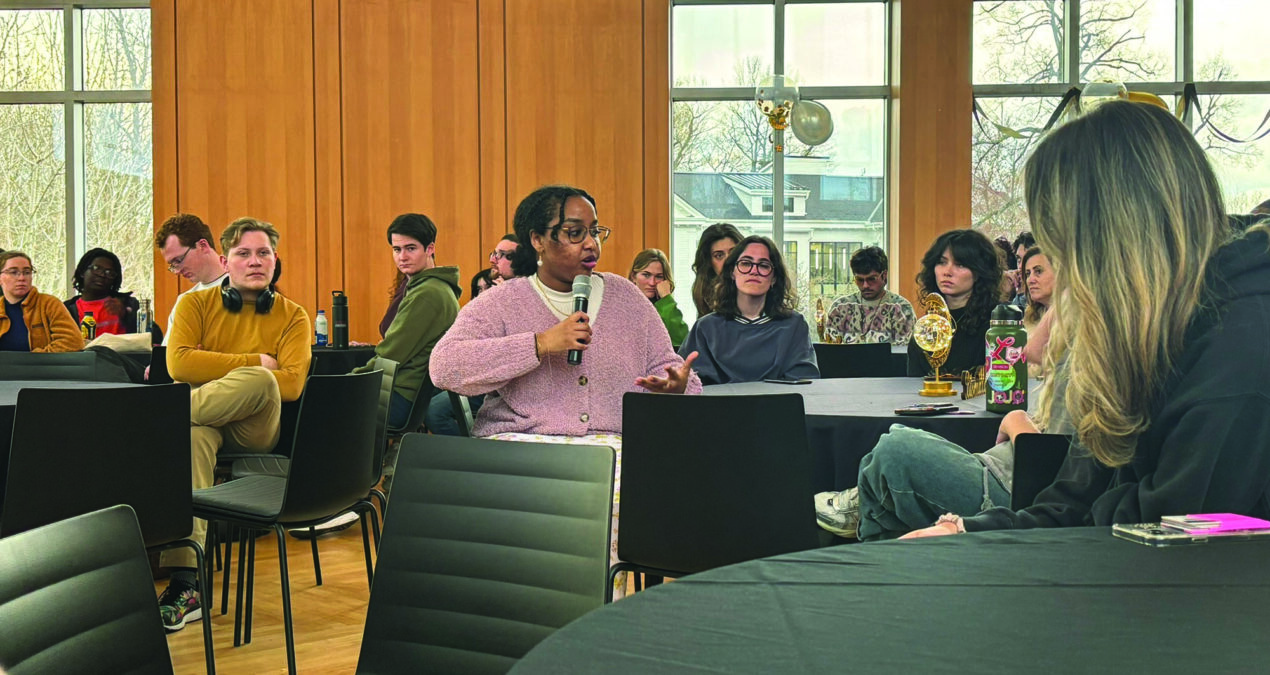Donald Keough, News Editor–
An impending storm seemed to forecast its own kind of solidarity on Mar. 30 as students and professors filled a lecture hall in Burton-Morgan, here to show their own solidarity for the continuing conflict in Gaza.
They were there for a teach-in, a type of educational discussion with the hopes of spreading a productive message. Many of those at Denison have been upset with the ongoing violence against Palestinians by Israel, and this teach-in was a call to action for many.
“It’s so important to have these discussions here and to talk to each other, and also to make it clear what you stand for, so that institutions know what you’re a part of,” Greta Schreiber ‘24 said during the Teach-In.
Schreiber is the co-president of Students for Justice in Palestine (SJP), and helped present a presentation on anti-zionism. She stressed the gravity of the genocide in Palestine, and the harm of recent advancements into the Gaza strip.
“As individuals living in the United States, which sends Israel approximately 3.3 billion in military aid per year, and is also funding the current deaths in Gaza, it’s our responsibility to educate ourselves and participate in solidarity actively,” Schreiber said.
Another part of the presentation addressed Islamophobia.
“People associate Palestine with Hamas, people associate every hijabi as Palestine,” Eiman Babiker ‘25 said. “I’ve seen that in my community, and I’ve seen that here. People need to understand that Palestine and Hamas are two different things.”
Babiker is the Public Relations officer for the Muslim Student Association (MSA) and spoke about the portrayal of Palestinians and how media outlets use condescending language.
“You can see the way [the media changes] their tone,” Babiker said. “They start to calm down as if they’re talking to a toddler about something intricate. The US media rationalizes Israel violence as a reluctantly understandable aspect of war, completely ignoring Palestines and the torment that they have been to continue to go through.”
Dr. Bayan Abusneineh, a Women’s, Gender and Sexuality Studies professor at Ohio State University and daughter of Palestine refugees displaced from the 1948 Nahkba shined light on the human aspect of Palestinians during a presentation.
“Gaza was not and is not only known for its death and destruction,” Abusneineh said. “These people are not numbers. Their neighborhoods are not just up for grabs by imperial powers. They continue to relive life and resist in ways unimaginable in the basement of this death.”
Her presentation also described israel’s targeted violence of pregnant women/families and the effects of post-war infertility.
“Palestinians have called this most current onslaught against this genocidal not just because of the growing number of deaths each day, although body comp is important, but the Israeli army is intentionally targeting what I call intimate spaces, spaces of reproductive life and spaces of survival, including the homes of hospitals, schools, United Nation shelters, bakeries, grocery stores, confining Palestinians in Gaza to both a quick and a slow death,” Abusneineh said.
As students and professors continually pointed out the increasing violence in Gaza, the discussions also called for different forms of action, from participating in more events like the teach in, to protesting physically. At the end of the teach-in, Kee Olandesca described her thoughts on what forms of protesting might look like.
“The roles that we take on in our bodies in different kinds of spaces [are a form of] protesting,” Olandesca said. “We have or like our bodies now, as part of the teach-in. In schools, we can also be bodies in cyberspace and social media accounts. We can be bodies in scholarly fields with the work that we produce. Knowing that we can be creative with the many different forms that we provide voice for others who might need our uplifting and recognizing that our bodies can be used to send like those in need of liberation.”

